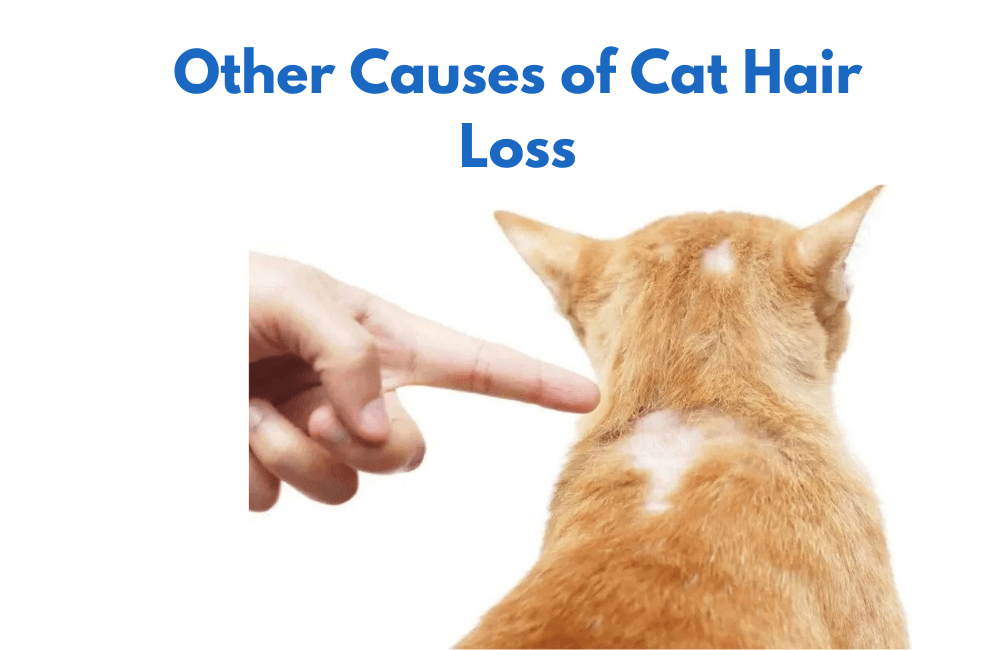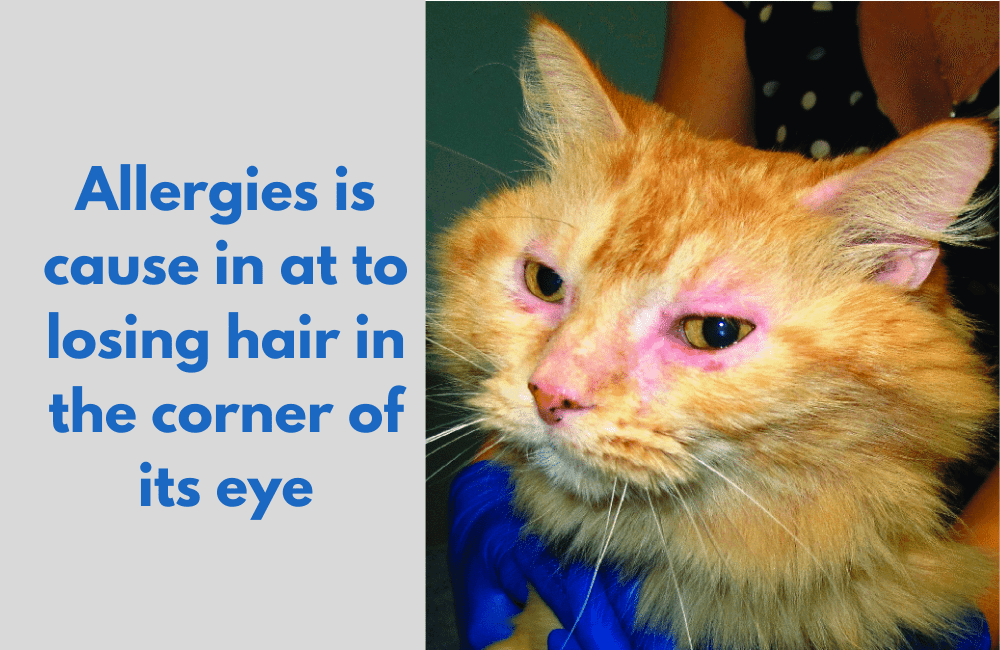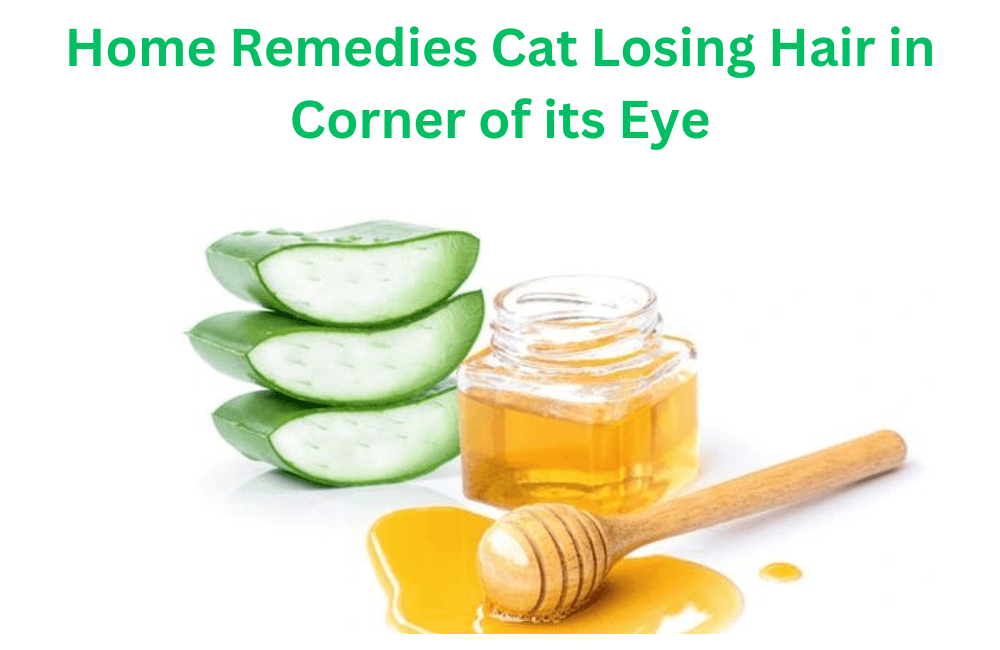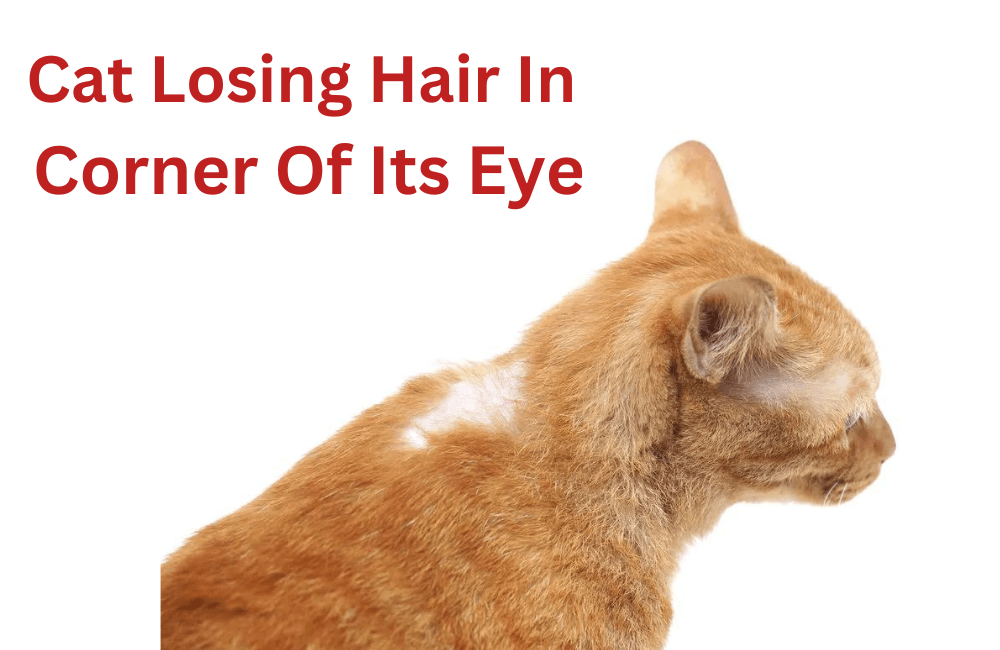The cat losing hair in corner of its eye. Have you ever noticed? If so, what is causing this problem, and how to fix it? Cat hair loss around eyes, also known as alopecia, is a common concern for many cat owners. It can affect cats of any age, breed, or color, and it can have various causes and treatments.
In this blog post, we will explore the potential causes of cat hair loss around the eyes, such as facial alopecia, flea infections, allergies, stress, and other conditions. We will also provide some tips and advice on how to treat and prevent a cat losing hair on his eyelid, and when to consult a veterinarian for proper diagnosis and care. By the end of this article, you will have a better understanding of why your cat is losing hair in the corner of its eye and what you can do about it.
Contents
Various causes of cats losing hair in the corner of their eye
Facial alopecia
- Facial alopecia is the term used to describe the normal hair loss between the eyes and the ears in cats. It is seen in both male and female cats, and it is more noticeable in the shorthaired varieties. It is not a sickness or medical condition to have facial alopecia. It is a normal aging process that occurs in most cats.
- Facial alopecia usually starts when cats are between 14 to 20 months old and continues until they are about 3 years old. During this time, the hair follicles in the area between the eyes and the ears become less active and produce thinner and shorter hairs. This results in a gradual thinning of the coat and a visible bald spot above the eyes of adult cats.
- Facial alopecia is harmless and does not require any treatment. It does not affect the health or well-being of your cat. Some breeds and colors are more prone to facial alopecia than others, such as Siamese, Burmese, and Abyssinian cats. These cats have a genetic predisposition to have less hair in this area.
- However, not all cases of cats losing hair around their eyes are due to facial alopecia. Some signs may indicate a different cause of hair loss, such as scratching, lesions, or infections. If you notice any of these signs, you should consult your veterinarian for a proper diagnosis and treatment.

Flea infections
- Flea infections are one of the most common causes of cat hair loss around eyes and other parts of the body. Fleas are tiny, blood-sucking parasites that can infest your cat’s fur and skin. Fleas can cause irritation, itching, and inflammation on your cat’s skin, leading to excessive scratching and grooming. This can result in hair loss, especially around the eyes, where the skin is thinner and more sensitive.
- To check for fleas on your cat, you can use a flea comb or a white towel. Gently comb your cat’s fur and look for any signs of fleas or flea dirt (flea feces). Flea dirt looks like small black specks that turn red when wet. You can also look for flea bites, which appear as small, red bumps on the skin. Flea bites are usually found on your cat’s lower back, belly, and inner thighs.
- The best way to treat flea infections in cats is to use a flea medication that kills both adult fleas and their eggs. There are many types of flea medications available, such as oral or topical treatments, flea collars, or shampoos.. You should consult your veterinarian for the best option for your cat. Some flea medications may have side effects or interactions with other medications, so you should always follow the instructions and dosage carefully.
- To prevent flea infections in cats, you should also treat your home and environment. Fleas can survive and reproduce in carpets, furniture, bedding, and other places where your cat spends time. You should vacuum and wash these areas regularly, and use a flea spray or fogger to kill any remaining fleas or eggs. You should also keep your cat away from other animals that may have fleas, such as dogs, rodents, or wildlife.
Helpful Content Related to Cats Health Problems:
Cat Not Eating After Dental Surgery
Cat Leaving Blood Spots On Bed
Allergies
- Allergies are another common cause of cat hair loss around eyes and other parts of the body. Allergies occur when your cat’s immune system overreacts to harmless substances called allergens. Allergens can be anything that your cat breathes in, eats, or touches, such as pollen, dust, food, or chemicals. Allergies can cause inflammation and itching on your cat’s skin, leading to excessive scratching and grooming. This can result in hair loss, especially around the eyes, where the skin is thinner and more sensitive.
- To check for allergies in your cat, you can look for other signs besides hair loss, such as sneezing, coughing, wheezing, runny eyes, ear infections, vomiting, or diarrhea. You can also consult your veterinarian for an allergy test, which can be done with a blood sample or a skin patch. An allergy test can help identify the specific allergens that are triggering your cat’s allergic reaction.
- The best way to treat allergies in cats is to avoid or eliminate the allergens from your cat’s environment or diet. This may require some trial and error, as well as some changes in your cat’s lifestyle. For example, you may need to switch to a hypoallergenic cat litter, use unscented cleaning products, or feed your cat a special diet. You can also ask your veterinarian for some medications that can help reduce the symptoms of allergies, such as antihistamines, steroids, or immunotherapy.
- To prevent allergies in cats, you should also keep your cat healthy and happy. This means providing a clean and comfortable environment, regular grooming and brushing, fresh water and food, and plenty of exercise and play. You should also monitor your cat for any signs of allergies and contact your veterinarian if you notice any changes in your cat’s behavior or appearance.

Stress
- Stress is another possible cause of cat hair loss around eyes and other parts of the body. Stress occurs when your cat’s emotional or physical well-being is threatened by factors such as changes in routine, environment, or social interactions. Stress can affect your cat’s immune system, making them more susceptible to infections and diseases. Stress can also trigger behavioral problems, such as over-grooming, which can lead to hair loss, especially around the eyes, where the skin is thinner and more sensitive.
- To check for stress in your cat, you can look for other signs besides hair loss, such as litter box issues, urine spraying, aggression, hiding, vocalization, pacing, or loss of appetite. You can also consult your veterinarian for a stress test, which can be done with a saliva or urine sample. A stress test can measure the level of cortisol, a hormone that is released in response to stress, in your cat’s body.
- The best way to treat stress in cats is to identify and eliminate or reduce the sources of stress in your cat’s life. This may require some observation and experimentation, as well as some adjustments in your cat’s lifestyle. For example, you may need to provide more litter boxes, scratching posts, or hiding places for your cat, or introduce new pets or people gradually and positively. You can also ask your veterinarian for some products that can help calm your cat, such as pheromones, supplements, or diets.
- To prevent stress in cats, you should also provide a stable and stimulating environment for your cat. This means maintaining a consistent routine, offering plenty of toys and activities, giving your cat enough attention and affection, and ensuring your cat’s health and comfort. You should also monitor your cat for any signs of stress and contact your veterinarian if you notice any changes in your cat’s behavior or appearance.
Other Causes of Cat Hair Loss Around Its Eyes
Besides solar dermatitis, there are other possible causes of a cat losing hair in the corner of its eye. Some of these include:
Fleas:
- These are tiny parasites that can bite your cat’s skin and cause itching, irritation, and hair loss. Fleas can be found anywhere on your cat’s body, but they often target the head and neck areas. To prevent and treat flea infestations, you should use a flea control product recommended by your veterinarian and regularly check your cat for signs of fleas, such as black specks or red bumps on the skin.
Mites:
- These are microscopic organisms that can live on or in your cat’s skin or ears. There are different types of mites, such as ear mites, walking dandruff, feline scabies, and demodex. Mites can cause scaling, crusting, hair loss, and itching on your cat’s skin, especially around the eyes and ears. Mites can also spread to other cats and humans, so it is important to seek veterinary diagnosis and treatment if you suspect your cat has mites.
Allergies:
Your cat may be allergic to something in the food, environment, or medication that triggers an immune response on the skin. Allergies can cause redness, swelling, itching, and hair loss on your cat’s face and body. Some common allergens for cats include pollen, dust, mold, flea saliva, and certain proteins in food. To identify and avoid the allergen, you may need to perform an elimination diet or allergy testing with your veterinarian.
Stress:
Your cat may be experiencing chronic stress due to changes in the household, lack of socialization, boredom, or other factors. Stress can affect your cat’s physical and mental health, and one of the possible signs is overgrooming. Overgrooming is when your cat licks, bites, or scratches itself excessively, leading to hair loss and skin damage. To reduce your cat’s stress, you should provide a safe and comfortable environment, enrichment activities, and positive interaction.
Ringworm:
- This is a fungal infection that affects the skin, hair, and nails of your cat. Ringworm can cause circular, red, and itchy lesions on your cat’s skin, along with hair loss and brittle nails. Ringworm is contagious to other animals and humans, so you should isolate your cat and disinfect the environment if you suspect ringworm. Treatment involves antifungal medication, topical therapy, and grooming.
These are some of the common causes of cat hair loss around eyes, but there may be other underlying conditions that require veterinary attention. If you notice any abnormal signs on your cat’s skin or hair, you should consult your veterinarian for a proper diagnosis and treatment plan.
Home remedies for cat losing hair in corner of its eye
some home remedies may help your cat with hair loss in the corner of its eye, depending on the cause and severity of the problem. However, these remedies are not a substitute for veterinary care, and you should always consult your veterinarian before trying any of them. Some possible home remedies are:
- Aloe vera gel: Aloe vera has soothing and healing properties that can help reduce inflammation and irritation on your cat’s skin. You can apply a small amount of aloe vera gel to the affected area using a cotton ball or a clean finger. Do this twice a day until the hair grows back.
- Coconut oil: Coconut oil has antibacterial and antifungal properties that can help fight infections and promote hair growth. You can massage a small amount of coconut oil into your cat’s skin around the eyes, avoiding the eye itself. Do this once a day until the hair grows back.
- Chamomile tea: Chamomile tea has anti-inflammatory and calming effects that can help relieve itching and stress on your cat’s skin. Make a pot of chamomile tea and allow it to cool. Then, soak a cotton ball in the tea and gently dab it on your cat’s skin around the eyes. Do this twice a day until the hair grows back.
- Apple cider vinegar: Apple cider vinegar has acidic and antiseptic properties that can help balance the pH level and kill bacteria on your cat’s skin. You can dilute one teaspoon of apple cider vinegar with one cup of water and spray it on your cat’s skin around the eyes, avoiding the eye itself. Do this once a day until the hair grows back.
These are some of the home remedies that may help your cat with hair loss in the corner of its eye. However, you should remember that these remedies are not guaranteed to work, and they may have side effects or interactions with other medications. Therefore, you should always consult your veterinarian before trying any of them, and follow their instructions and recommendations.

Conclusion
In this blog post, we have learned about the possible causes of a cat losing hair in corner of its eye, such as facial alopecia, flea infections, allergies, stress, and other conditions. We have also provided some tips and advice on how to treat and prevent cat hair loss around eyes, and when to consult a veterinarian for proper diagnosis and care.
Some key takeaways from this article are:
- Cat hair loss around eyes is a common concern for many cat owners, and it can have various causes and treatments.
- Facial alopecia is a normal aging process that does not require treatment, while flea infections, allergies, stress, and other conditions may need medical attention and intervention.
- To check for the cause of cat hair loss around eyes, you should look for other signs and symptoms, such as itching, lesions, or infections, and perform a flea comb or an allergy test if needed.
- To treat and prevent cat hair loss around eyes, you should avoid or eliminate the sources of irritation or inflammation, use appropriate medications or products, and provide a clean and comfortable environment for your cat.
- To ensure your cat’s health and well-being, you should monitor your cat for any changes in behavior or appearance, and contact your veterinarian if you have any questions or concerns.
We hope this blog post has been helpful and informative for you. If you liked this article, please share it with your friends and fellow cat lovers. If you have any comments or feedback, please leave them below. We would love to hear from you. Thank you for reading!
FAQs about on cat losing hair in corner of its eye:
Q: What is facial alopecia in cats?
- A: Facial alopecia is the normal hair loss between the eyes and the ears in cats. It is not a disease or a disorder, but a natural aging process that occurs in most cats. Facial alopecia does not require any treatment, unless there are other signs of skin problems, such as scratching, lesions, or infections.
Q: How can I tell if my cat has fleas?
- A: Fleas are tiny parasites that can cause itching, irritation, and hair loss in cats. To check for fleas, you can use a flea comb or a white towel and look for fleas or flea dirt (flea feces) on your cat’s fur and skin. You can also look for flea bites, which are small, red bumps on your cat’s skin, usually on the lower back, belly, and inner thighs.
Q: What are the common allergens for cats?
- A: Allergies are when your cat’s immune system overreacts to harmless substances called allergens. Allergens can be anything that your cat breathes in, eats, or touches, such as pollen, dust, food, or chemicals. Allergies can cause inflammation, itching, and hair loss in cats, especially around the eyes and other sensitive areas.
Q: How can I reduce stress in my cat?
- A: Stress is when your cat’s emotional or physical well-being is threatened by factors such as changes in routine, environment, or social interactions. Stress can affect your cat’s health and behavior, and one of the possible signs is overgrooming, which can lead to hair loss and skin damage. To reduce stress in your cat, you should provide a safe and comfortable environment, enrichment activities, and positive interactions for your cat. You can also use some products that can help calm your cat, such as pheromones, supplements, or diets.
Q: When should I take my cat to the vet for hair loss?
- A: If your cat’s hair loss is sudden, severe, or accompanied by other symptoms, such as scratching, lesions, infections, or changes in appetite or behavior, you should take your cat to the vet for a proper diagnosis and treatment. Some of the possible causes of hair loss that require veterinary attention are ringworm, mites, solar dermatitis, or sebaceous adenitis. Your vet can prescribe the best medication or therapy for your cat’s condition.




